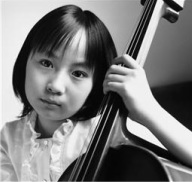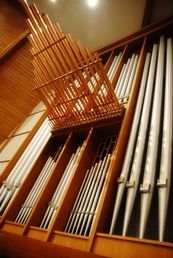 Is musical talent something that we are born with? Or is musical talent based solely on environment and training? It has been interesting to hear so many different perspectives on the same subject as I have begun teaching music, and in particular, vocal music. Parents of children who are taking music lessons or adult music students seem to be the most firmly set in their view of this topic. Can we find a balanced perspective?
0 Comments
 I recently heard about a man working on funeral service preparations for when his time came. When asked about what sort of music would be wanted the man said, “NOT the organ! It reminds me too much of a funeral!” Stories like this can be all too familiar in churches today, where the organ has received a bad reputation. I submit that this “bad rap” can be related to several things that we as organists can lack if we are not careful: a lack of excellence, a lack of variety, and a lack of passion. So, one may ask, “How can I do better?” Here are several things to consider when playing the organ in worship so that the instrument can be utilized effectively: Every once in a while you come across a unique product or service that you want to let others know about. Harmony Passion would like to present some "Product Spotlight" features to help musicians and music teachers find some great resources that will help them.
The product I want to mention today is a band method curriculum developed by Nick Kozar, band director and music educator on both the high school and college level. When I spoke with Mr. Kozar about his approach for developing these band instrument lesson books, he gave me some good insight. One thing that he has found as a weakness in previous band method books that he used was the lack of rhythm training before students had to begin branching out and playing multiple notes. The Solid Foundation band method books teach students to begin with one note, but learning multiple rhythms, so that a proper rhythmic foundation is laid. Another aspect of the books that I appreciate is that the melodies used are from traditional songs and hymns. The use of classic melody lines allows the student to be exposed to good music while at the same time learning to play. Unless you know what you are looking for, these books are not so easy to find online. If you'd like to see the books and pricing, I have included the links below:
For more music education products by A Beka Book, click here. by Andy Daughtry Associate Pastor of Worship and Discipleship First Baptist Church Quitman, Georgia To this day, she remains one of the finest church musicians I have ever known. I remember vividly the moment I heard her play the organ for the first time. It was a thrilling, triumphant sound, played with a flawless power that made you want to sing. Soon, she allowed me to sit on the bench beside her as she played the postlude, or to turn pages for her in choir rehearsal. I literally learned how to accompany while watching and absorbing every movement of this special lady. For most of her nearly 90 years, Juanita Ragans has served her church and community as an accompanist for worship, weddings, funerals, and countless community events in the small North Florida town where I spent my boyhood. I have since met and been inspired by many like her – some as recently as last month at Church Music Georgia. These persons are gifted musicians who take seriously their role as an accompanist; they strive for excellence and are constantly looking for new ways to be effective in their calling as worship leaders. As directors, we know how critical the accompanist is to our congregations, choirs and soloists. The accompanist every director needs goes beyond mere technical skill; it goes beyond simply occupying a place at the piano bench or organ console. It comes from a true heart for ministry – a heart for serving Christ through music. I believe there are three key areas to think about as accompanists when we seek to go “beyond the bench.” First, be the accompanist every director needs in rehearsal. As accompanists, our rehearsal begins long before the first note of choir rehearsal or a session with a soloist or ensemble. Our adequate preparation is critical to the effective rehearsal. Many years ago, I made it a rough rule of thumb to work at least 2 hours in preparation for every hour of choir rehearsal or worship I was scheduled to accompany. I used this time for score review, learning vocal parts, and working out difficult passages that may be covered in the rehearsal. There is such a difference in accompanying versus solo performance. We must be sensitive to those we are accompanying; we need to give them what they need when they need it. We must anticipate what may be needed and provide adequate support. The better prepared we are musically, the more effective we can be in providing that sensitivity and support. This in turn makes for a better rehearsal and, ultimately, enhances the worship experience for choir and congregation. We are at our best as accompanists when we enable that choir, soloist, ensemble or even an entire congregation to be at their best. (I like to call it Andy’s Golden Rule of Accompanying: “Do no harm!”) Our calling – and our Savior – deserve no less than our very best, and that begins with passionate preparation. Next, be the accompanist every director needs in worship. Once again, preparation is the key. I read many years ago the late Virgil Fox, the incredible organist at New York’s famed Riverside Church, always began his rehearsals for worship by practicing the hymns first. I agree! As accompanists in worship, we are working to help create an environment where the Holy Spirit can work. Practice those hymns and worship songs! Study the lyrics and look for ways to amplify the text; pray that God would use you to help lead His people in worship. Look for creative ways to engage the congregation musically through imaginative introductions and modulations, differing keyboard techniques, and fresh service music with an eye toward being sensitive to the mood and flow of worship. I believe one of the critical needs in worship today, regardless of worship style, is the active engagement of God’s people in the act of worship. As a director, I need an accompanist that shares my passion to do all they can to help God’s people worship! Finally, be the accompanist every director needs in ministry. I firmly believe that true, God-honoring ministry begins in the heart. A director needs an accompanist that has a heart for ministry. As a director, I can teach and refine skill. I cannot teach heart. Take the initiative – be fully engaged. Keep the lines of communication open with your director and others with whom you serve. Learn how to handle conflict gracefully. I love Boyd Bailey’s wonderful principle of “public praise and private correction.” Use the word “we” a lot. Simply put, we must surrender our gifts and abilities to God to be used for His glory as we serve His people in love. Live and serve in a manner worthy of the Lord’s work. Develop a heart for ministry! Additionally, we must be constantly looking for ways to grow personally, musically and spiritually. This is particularly true for the worship accompanist. So often, as we accompany worship, we don’t have a chance to truly worship ourselves. Opportunities for personal worship then become even more critical. We can’t help lead our congregations to a place we have not been! As I think of being an accompanist that goes “beyond the bench,” I am reminded of those powerful words inscribed on the wall of Coral Ridge Presbyterian Church: “Excellence in all things, and all things to God’s glory.” God will give us the grace, let’s all work together so He gets the glory!
Thanks to Elizabeth Thacker at Plum Grove Strings, I was made aware of this article in the LA Times:
The article outlines a study that was recently done which related music lessons to brain function. Much research has been done showing the link between music and mental health, but this study went one step further. Students that took lessons even years earlier showed better brain function than their peers. Music lessons for children not only benefit them today, but will help them for years to come. Another article in the LA Times discusses how actually participating in music (singing or playing an instrument) has much greater impact on the mind than passively listening. Instead of putting classical music on your child's ipod, try putting your child into music lessons. These are a couple of articles that music teachers could reference when talking with parents or prospective students. |
Search the BlogSubscribe via emailFind By Category
All
Archives
January 2016
|
Harmony Passion - Bringing together ideas and resources for church and community musicians



